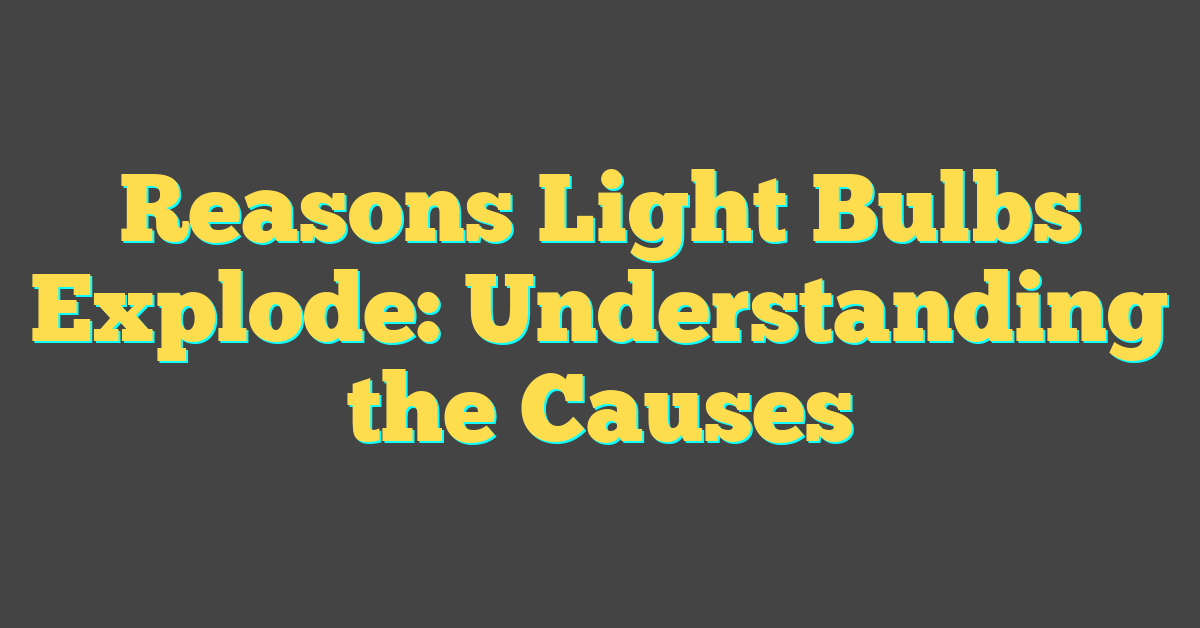Light bulbs are such a common feature in our lives that their sudden failure can be both surprising and unnerving. Sometimes, the issue is more dramatic than a simple burnout—on rare occasions, a light bulb can actually explode. Understanding why these explosions occur is key to preventing them and ensuring the safety of your home. Manufacturing defects, such as insufficient insulation at the base of the bulb, can be a significant culprit, as this can lead to the base melting and the bulb shattering.


Besides issues during production, environmental influences play a pivotal role in the integrity of light bulbs. Extreme temperature fluctuations can stress the glass, making it more prone to breaking, while electrical concerns, like a power surge, can push a bulb beyond its heat tolerance. Additionally, using a bulb with incorrect wattage or rough handling can also contribute to the risk of explosion. Knowing the various factors that cause light bulbs to explode helps you take proactive steps to protect yourself and your property.
Key Takeaways
- Light bulb explosions can result from production flaws and inadequate insulation.
- Temperature changes and electrical surges are environmental factors causing bulb breakage.
- Incorrect wattage and handling might also compromise bulb safety.
Understanding Light Bulbs
https://www.youtube.com/watch?v=j9ZImrfCF7c&embed=true
When investigating why light bulbs explode, it’s essential you understand the basics of different light bulbs and how they function. This knowledge will lay the groundwork for recognizing the factors that can lead to such unexpected events.
Types of Bulbs
Light bulbs come in various types, each with unique characteristics and uses. Here are the most common ones that you might have in your home:
- Incandescent: These are the traditional bulbs that have been around for over a century. They emit light by heating a wire filament until it glows.
- Halogen: Similar to incandescent bulbs, but with a small amount of halogen gas that increases efficiency and life span.
- LED Bulbs: Light Emitting Diode (LED) bulbs are a modern, energy-efficient option. They work by passing an electrical current through a microchip, illuminating small light sources to create visible light.
How Light Bulbs Work
Understanding the functionality of light bulbs can help you grasp why they might explode. Here’s a brief breakdown:
Incandescent and Halogen: Electricity flows to the filament, heating it to a temperature that produces light. The glass encapsulates the filament, vacuum or filled with inert gas, to protect it and increase efficiency.
LED Bulbs: They use a different approach where electricity flows through a microchip, which illuminates tiny light sources called diodes. The result is efficient and long-lasting light.
Each type of bulb is designed to meet specific lighting needs, and knowing their workings can help you choose the right one for your space and ensure they are used safely.
Common Reasons for Bulb Explosions
https://www.youtube.com/watch?v=F3qSElwot8Y&embed=true
In understanding why your light bulbs may explode, it’s crucial to consider a few technical aspects that can often lead to this sudden inconvenience.
Power Surges and Voltage Issues
When your home experiences a power surge, this abrupt spike in electrical current can overwhelm light bulbs, leading to explosions. Voltage surges can be particularly damaging if they’re significantly above the bulb’s design specifications.
Faulty or Damaged Bulbs
Faulty manufacturing of light bulbs can leave them vulnerable to explosions. Insufficient insulation at the bulb’s base or a thin glass can lead to failure. Additionally, any damage sustained by the bulb, even if not immediately visible, can compromise its integrity.
Improper Installation
A loose connection between the bulb and socket may cause arcing, which generates heat and leads to a burst. Conversely, over-tightening your bulb can stress the glass, making it more likely to shatter under thermal or mechanical pressure.
Electrical Concerns
https://www.youtube.com/watch?v=oYAZgAdf0As&embed=true
When dealing with light bulbs, your electrical setup is crucial. Faulty wiring or fixture issues might not only cause bulbs to fail but also lead to them exploding, which is a safety hazard you definitely want to avoid.
Wiring and Fixture Issues
« Danger of Incandescent Light Bulbs: Unveiling Hidden Hazards
Light Bulb Camera Pros and Cons: Unveiling the Hidden Truths »
Wiring problems: If the wiring in your home is old or not up to code, it can cause fluctuations in electrical current. These fluctuations can lead to both light bulbs blowing or, worse, exploding. Look out for signs like flickering lights or bulbs burning out too quickly, as they can indicate underlying issues with your home’s wiring.
- Loose connections: A loose contact in the light fixture or socket may cause electricity to arc, which generates excess heat and could potentially cause a bulb to explode.
- Overloaded circuits: Connecting too many devices on a single circuit can lead to overheating, which poses a risk not only to light bulbs but to your safety as well.
- Incompatibility: Always ensure that your light fixtures are compatible with the type of bulbs you are using. Using the wrong bulb can lead to overheating and possible explosions.
Professional Inspection
If you suspect that electrical issues might be causing your light bulbs to explode, it’s best to call in a professional electrician for an inspection. They have the expertise to:
- Inspect and diagnose any electrical issues in your home.
- Repair or replace faulty wiring and ensure that all electrical components meet safety standards.
- Provide advice on the proper maintenance of your electrical system to prevent future light bulb explosions.
Keep in mind that while it might be tempting to address these issues yourself, working with electricity can be dangerous. Professional assessment and repair are essential to ensure your home’s safety.
The Role of Wattage in Bulb Health
https://www.youtube.com/watch?v=CL2f9f80-RY&embed=true
Wattage is crucial for the longevity and safety of your light bulbs. Choosing the right wattage ensures your bulbs operate efficiently without the risk of premature failure or hazards.
Matching Wattage Ratings
When selecting a light bulb, always match the wattage rating on the bulb to the rating recommended for your fixture. The wattage is a measure of electrical power, and the fixture’s rating indicates the maximum wattage it can handle safely and effectively. If the fixture specifies a 60-watt maximum, ensure you choose a bulb with a 60-watt rating or lower. This matching is essential to ensure that the bulb doesn’t draw more power than the fixture is designed to supply.
Consequences of Incorrect Wattage
If you use a bulb with an incorrect wattage that’s too high for your fixture, it can lead to overheating. The excess heat cannot dissipate properly, leading to potential hazards such as melted fixtures or even an exploded bulb. For example, if your lamp has a max rating of 40 watts and you fit a 75-watt bulb, you’re creating a fire risk. Always adhere to the fixture’s recommended wattage to avoid these serious risks.
Physical Factors Causing Explosions
https://www.youtube.com/watch?v=8vgESnO6YQ4&embed=true
When considering the durability of your light bulbs, it’s important to be aware of the physical factors that can contribute to their unexpected shattering. Let’s focus specifically on how the fit of the bulb in the socket and various environmental conditions might play a role in such incidents.
Socket Fit and Bulb Base
Incorrect socket fit: If a light bulb is screwed in too tightly, the base of the bulb may be under undue stress, leading to the potential for an explosion. While securing the bulb, be mindful of the pressure you apply – it should be snug, but not forceful, to avoid creating tension on the glass.
Bulb base insulation: Inadequate insulation at the base of the bulb can prompt overheating, which may cause the base to melt. Consequently, this might lead to the release of inert gas within the bulb, creating a pressure imbalance that can result in an explosion. You can learn more from experts discussing the causes and prevention of light bulb explosions.
Environmental Impacts
Temperature and humidity: Your light bulbs are not fans of extreme temperature fluctuations or high humidity. These conditions might lead to condensation within the bulb, which can disrupt the delicate balance of pressure, increasing the likelihood of an explosion.
Ventilation: Remember to check if your light fixtures promote proper ventilation. Light bulbs need to dissipate heat effectively, and without adequate airflow around them, the risk of overheating and bursting is heightened.
Through simple awareness and careful handling, you can mitigate these risks and keep your home illuminated safely.
Human Interaction and Bulb Safety

When dealing with light bulbs, your safety hinges on correct handling and installation. It’s essential to understand the precautions to prevent mishaps, like a bulb exploding, which could lead to injury from glass shards or burns on your skin.
Handling and Installation Precautions
Before Installing a New Bulb:
- Ensure your hands are clean and free from oil, as oily hands can leave residue on the bulb, potentially causing hot spots that may lead to a bulb explosion.
- Use gloves when possible; this not only prevents oils from your hands from transferring to the bulb but also protects your skin if the glass breaks.
Installing the Bulb:
- Do not over-tighten the bulb, as this can cause stress on the glass that may result in breaking or exploding.
Safe Bulb Removal and Disposal
Removing a Burnt-Out Bulb:
- Unplug the lamp or switch off the power at the circuit breaker for overhead lights.
- Wait for the bulb to cool down to avoid the risk of a burn.
Disposal Tips:
- Wrap the bulb in its original packaging or with newspaper to prevent glass shards from scattering.
- If a bulb does break, carefully clean up the pieces—consider wearing gloves to protect your skin—and dispose of them in a sealed bag.
Protective Measures Against Bulb Explosion

Ensuring the safety of your home and the longevity of your light bulbs involves simple but crucial steps. By choosing the right bulb and utilizing surge protectors, you can significantly reduce the risk of unexpected bulb explosions.
Choosing the Right Bulb
Selecting the recommended light bulb for your fixture is a key step in preventing mishaps.
- Always check the wattage requirements of your light fixture and match it with the bulb you purchase. Using a bulb with too high wattage can lead to overheating.
- Opt for bulbs from reputable manufacturers to ensure quality and durability.
Utilizing Surge Protectors
Surge protectors are essential in safeguarding your electrical devices from sudden spikes in voltage.
- Incorporate a surge protector in your setup to prevent potential damage caused by power surges, which can lead to bulb explosion.
- Remember to periodically check your surge protectors to make sure they are functioning properly, as they can wear out over time.
By following these guidelines, you’re not just protecting your bulbs, but also enhancing the safety of your home.
Understanding and Preventing Overheating
https://www.youtube.com/watch?v=1ddEaNjSxEw&embed=true
Overheating is a primary cause of light bulb explosions. Understanding the signs of this phenomenon and how to mitigate it is essential for maintaining both safety and efficiency in your lighting.
Signs of Overheating
- Bulb Surface Temperature: If the glass surface of the bulb is too hot to touch, it’s likely overheating.
- Discoloration: A blackening or browning at the base or along the bulb’s surface is a telltale sign of excessive heat.
- Flickering: Frequent flickering can indicate that the bulb is struggling with thermal regulation.
Preventing Thermal Buildup
- Adequate Ventilation: Ensure your light fixtures allow for proper airflow to dissipate heat effectively.
- Correct Wattage: Always use bulbs with the appropriate wattage for the fixture to prevent excess heat generation.
- LED Bulbs: Consider using LED bulbs, which are engineered to produce less heat and reduce the chance of a hot spot.
- Secure Connections: Tighten loose fixtures to avoid electric arcs, which can contribute to overheating.
By being aware of the indications of overheating and taking proactive steps to prevent thermal buildup, you can safeguard your home from the risks associated with excessively hot light bulbs.
Manufacturing Defects and Quality Control

When you’re dealing with light bulbs, it’s crucial to understand that sometimes bulbs explode due to problems that arise during their manufacture. Recognizing these flaws is key for your own safety.
Identifying Defective Products
You can spot a defective light bulb by checking for obvious visual defects such as cracks, loose filaments, or a damaged base. Manufacturers often apply a high-quality seal to their products, indicating that the item has passed strict quality control checks. If you’re in doubt, look for this mark of assurance on the packaging before purchasing.
Industry Standards for Manufacture
Manufacturers are bound by industry standards that stipulate how light bulbs should be produced to ensure safety and function. These standards include the proper use of materials and ensuring that insulation at the base of the bulb is sufficient to prevent the metal base from melting. If these standards are not met, the bulb could have a manufacturing defect that leads to failure and possibly even an explosion.
Responding to a Light Bulb Explosion
If your light bulb has exploded, the priority is to ensure your safety and assess if professional help is needed. Here’s what you should do.
https://www.youtube.com/watch?v=dv7eHEUV4Rk&embed=true
Safety Precautions Post-Explosion
- Clear the Area: Immediately leave the room to avoid the risk of injury from shattered glass.
- Power Off: Before cleanup, turn off the power to the light source at your circuit breaker to prevent the risk of electric shock.
- Cleanup: Use a broom and dustpan to carefully sweep up the glass. For smaller pieces, consider using sticky tape to pick them up.
- Disposal: Place the debris in a solid container, not a regular garbage bag, to prevent the glass from causing injury.
When to Consult an Expert
- Recurrent Explosions: If light bulbs in your home frequently explode, it’s time to contact an electrician.
- Damaged Socket: Inspect the light socket. If it’s damaged or shows signs of burning, do not attempt to fix it yourself—call an expert.
- Uncertainty: If you’re unsure about the safety of your electrical system post-explosion, it’s best to seek the advice of a professional.
Conclusion

Exploding light bulbs can be startling, but understanding the reasons behind this occurrence assists in prevention. Your light bulb could explode due to a voltage spike caused by a sudden surge in electricity. It is crucial to ensure that the bulbs you use can handle your home’s voltage levels.
Moisture is another common culprit. Light bulbs, particularly in exposed fixtures, may be prone to exploding when water enters the circuit. Hence, be vigilant about moisture around your lighting fixtures.
Manufacturing defects, such as insufficient insulation at the bulb’s base, may also lead to an explosion. Always opt for high-quality bulbs from reputable brands to mitigate this risk. The integrity of the bulb’s structure ensures that the gas contained within remains at a stable pressure.
Lastly, to prevent overheating, avoid prolonged use or placing bulbs near flammable materials. Overheating can cause the pressure inside the bulb to build until it shatters.
Regularly check your light bulbs and fixtures for any signs of damage or wear, and replace them as needed. By staying informed and attentive, you can help ensure your light bulbs serve their purpose safely and effectively.




